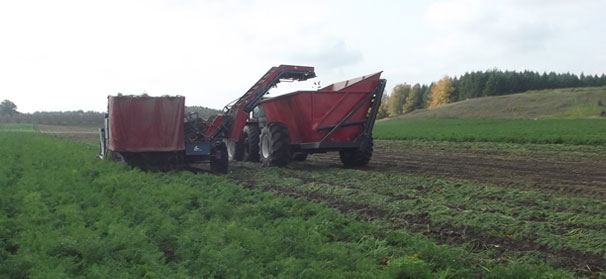

Nov 19, 2012New MVC president wants to tackle labor, public relations
Ralph Oomen is in line to become the next president of the Michigan Vegetable Council (MVC). Currently the vice president, he’ll start his two-year term as president in 2013.
Ralph’s family has been farming in western Michigan for nearly a century, ever since his grandfather, Henry Oomen, bought a 40-acre farm in Hart, Mich. Henry raised dairy cattle, corn, small grains and potatoes. When he started slowing down, his son, Joe, took over. Joe was a dairyman, but also grew vegetables. He had seven children, four boys and three girls. Two of his sons, Ralph and Ken, took over the home farm in 1983, when it was Joe’s turn to slow down (Joe died last year). Their brothers still farm nearby.
As co-owners of Oomen Bros. Vegetable Farms, Ralph, 49, and Ken, 47, manage about 1,500 acres. They raise hogs, corn, small grains, tart cherries and Christmas trees, but their main crops are vegetables: asparagus (275 acres), carrots (about 240 acres), winter squash (125 acres), zucchini (about 105 acres) and broccoli (about 50 acres). They also raise their own asparagus seed, Ralph said.
They lost some of their asparagus to frosts this past spring, but fresh prices were as good as they’ve ever been, which helped recoup some of the losses, Ralph said.
About 60 percent of their asparagus goes to the fresh market these days; the rest to processing. More and more of their acreage has shifted to fresh over the years, Ralph said.
“Both markets need to be strong for us to make money,” Ken said.
The rest of their vegetables go to processing markets, too. Customers include Gerber, Libby’s Pumpkin, Arbor Farms and Michigan Freeze Pack. Oomen Bros. is one of four farms that own the Michigan Freeze Pack processing plant in Hart.
“If you’re a vegetable grower, it’s good for business to be involved in a processing plant,” Ralph said. “It’s given us opportunities that we wouldn’t have had.”
For one thing, it helps you make decisions about which commodity to grow, he said.
Over the years, they’ve allowed Michigan State University to plant research plots on their ground, which has often given them immediate access to techniques that proved successful. They were one of the first growers to start fumigating their asparagus, for example, which is now a fairly common practice. There’s been a new trend toward irrigating asparagus, also, which wasn’t typical in the past. Oomen Bros. is concentrating heavily on irrigation, which is useful on all vegetable crops, Ralph said.
The brothers have six full-time employees, and hire about 45 migrant workers during asparagus harvest, Ken said.
Finding workers is tough in general, but it was easier this year. The spring freezes ravaged much of the state’s fruit crop, which left lots of pickers looking for alternative work to carry them through the season. The only tight spot was during asparagus harvest, when all the asparagus growers in the region needed workers at the same time, Ralph said.
Next year will be a different story, however, when all those surplus workers go back to picking fruit. The perpetual labor problem will return, Ken said.
Ralph summed up the labor problem produce growers face these days: Most people in the country don’t want to work in farm fields as hand-harvest labor. Certain ag sectors need that kind of labor, however, so a foreign guest-worker program is not a bad idea.
“We need those people in this country to do this kind of work,” he said. “Everybody is putting it on the back burner politically, because they don’t know how to deal with it.”
When Ralph becomes president of MVC, he plans to advocate for a solution to agriculture’s labor problem.
Another thing agriculture needs is better public relations. Most people aren’t tied to farming these days, so any time the media draws attention to a controversy in the fields, people automatically assume that farmers are the bad guys.
“It’s just the way it is,” Ralph said. “If you don’t understand something, obviously it’s bad.
“We have to keep everybody informed about what’s really happening, so we’re viewed in a positive way instead of a negative way.”
He used organic farming as an example. A lot of people love the idea of organic. It makes them feel good – and that’s understandable. But is organic farming really better for them?
The soil, food-safety and chemistry rules of some of their customers are extremely strict, for example – stricter than organic rules, in some ways. But Oomen Bros. is not an organic farm. The general public needs to be aware of these distinctions, Ralph said.
“We have to make sure we keep our voice out there, that we’re being heard correctly,” he said. “That’s what the Michigan Vegetable Council does.”
By Matt Milkovich, Managing Editor














